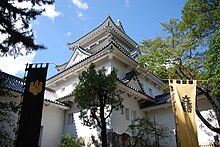Ōgaki Castle: Difference between revisions
Category, external link |
Kichiverde (talk | contribs) |
||
| Line 29: | Line 29: | ||
==Present day== |
==Present day== |
||
In 1945, the donjon and the rest of the castle was destroyed during air raids in [[World War II]]; it was rebuilt in 1959.<ref name="jnto"/> The current castle is a replica of the keep and the inside serves as a museum to artifacts from the [[Battle of Sekigahara]] in 1600. |
[[Image:Ogaki Tenshu.JPG|thumb|A close up of the main keep]]In 1945, the donjon and the rest of the castle was destroyed during air raids in [[World War II]]; it was rebuilt in 1959.<ref name="jnto"/> The current castle is a replica of the keep and the inside serves as a museum to artifacts from the [[Battle of Sekigahara]] in 1600. |
||
== External links == |
== External links == |
||
Revision as of 02:25, 12 October 2009
| Ōgaki Castle 大垣城 | |
|---|---|
| Ōgaki, Gifu Prefecture, Japan | |
 Ōgaki Castle | |
| Coordinates | 35°21′43″N 136°36′58″E / 35.36194°N 136.61611°E |
| Site information | |
| Condition | Reconstruction |
| Site history | |
| Built | 1500 |
| Demolished | 1871 |
| Garrison information | |
| Past commanders | Ujiie Naomoto, Itō Morikage |
| Occupants | Takenokoshi Clan, Ujiie clan, Itō clan, Okabe clan, Matsudaira clan, Toda clan |
Ōgaki Castle (大垣城, Ōgaki-jō) is a castle located in the city of Ōgaki, Gifu Prefecture, Japan. Other names for the castle include Bi Castle (麇城 Bi-jō) and Kyoroku Castle (巨鹿城 Kyoroku-jō).
History
When the castle was originally built, it had four levels and four different kinds of moats. In the late 16th century, however, Toyotomi Hideyoshi realized the strategic location of the castle and further strengthened it by building the donjon.[1] Due to the historical importance of the castle, including its role in the Battle of Sekigahara in 1600, the donjon was designated a National Treasure in 1936.[1]
Present day

In 1945, the donjon and the rest of the castle was destroyed during air raids in World War II; it was rebuilt in 1959.[1] The current castle is a replica of the keep and the inside serves as a museum to artifacts from the Battle of Sekigahara in 1600.
